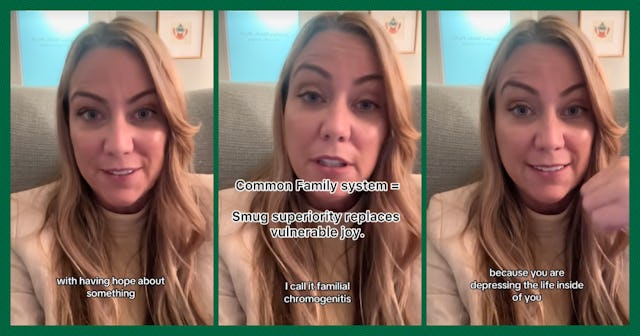Did You Grow Up In A Negative, Judgmental Family? Here’s How It Can Affect You.
What starts out as a potentially helpful anxiety response ultimately becomes something that hurts families.

“All happy families are alike; each unhappy family is unhappy in its own way.” Honestly, the truth in the opening lines of Anna Karenina never cease to ring true to me. The dynamics in place and perpetuated by families were often set into motions generations earlier and the unhappy ones have the unenviable task of addressing and coming out from the shadow of those traumas.
But while every family is unique, there are some recurring themes from one to another, and Dr. Angelica Shiels wants us to talk about one of them a bit more. It’s formative, intergenerational, and under-discussed. “I call it Familial Curmudgeonitis,” she explains.
“This is when you have a very long line of nobody being vulnerable, including and especially the type of vulnerability that comes with being positive,” she observes. Enjoying a hobby, excitement, being hopeful are all replaced with negativity, apathy, or a smug superiority.
“Nobody connects or bonds over anything positive because that’s just too vulnerable,” Shiels continues. “And then you don’t end up having a real relationship because you are suppressing the life inside of you and you’re going to be ostracized if you don’t go along with the curmudgeonitis rules.”
Instead, bonding in this dynamic tends to happen over negative things: complaining about food in a restaurant, gossiping about neighbors, and/or judging others in and out of the family.
“Being like that, she explains, “is your ticket to belonging.”
So how does it start? The answer, unsurprisingly, is often trauma or deeply felt stress. Think wars, where being skeptical and working through the worst possible outcomes could be the key to survival.
“So it starts out as an anxiety response. But then, that way of being ... keeps getting passed down in generations to the point where anxiety and stress is not necessary,” Shiels says. “It’s just kind of part of the personality, and it’s part of the way you bond and you’re part of the group. People that are silly and take risks and have hope and get excited ... are outsiders.”
Shiels categorizes growing up under these conditions as “developmental deprivation” for children, who don’t get to see, experience, or express unrestrained excitement, hopefulness, or enthusiasm. Even expressing joy can be mocked and so children learn to dampen it. But it happens at a cost.
“To have that suppressed in a child, that’s not just going to affect the child’s mental health, but that’s going to affect how they show up in relationships later,” she concludes.
Sadly, a lot of people saw their own family dynamic in this exploration.
“The only humor my family had growing up was making fun of other people, usually other people’s earnestness,” one commenter notes. “It taught me really early not to show too much enthusiasm.”
“I hate spending time with my parents for this exact reason,” agrees another. “They are haters and not even in a funny way.”
“My dad has a negative comment for everything and I’ve started to unpack how it affected me,” shares a third. “I can’t believe nobody is judging me; after all, I grew up around someone who was judging everyone.”
Some see it beyond families and into certain segments of a culture.
“I feel this way about people who think ‘I’m GenX, sarcasm is our love language,’” one complains. “It’s genuinely an obnoxious way of communicating.”
One (aka me/myself/I) might even say that a certain generation dubbing everything “cringe” is rooted in a deep fear of being judged and, as a result, they develop an apparent allergy to enthusiasm and authenticity.
Nobody is saying people should be mindlessly optimistic, pleasant, and agreeable. But before you feel moved to rain on someone’s parade, even if you think the parade is ill-advised and silly, stop and think if that’s really how you feel or if it’s an off-shoot of some familial curmudgeonitis.